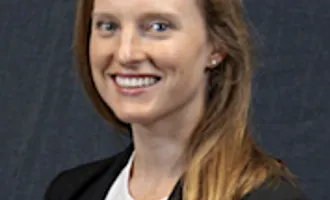Life of a Grad Student: Sixth Year
Student 1
Female/Parnassus
Tell me about your experience at UCSF so far.
It’s been a really good experience overall. I came straight from undergrad to grad school, and I’d done research in the lab before, but not full-time.
I remember when I came here, I was super-impressed by all the grad students — especially the ones in the classes above. I’d see them present in seminars, and I thought, “What did I get myself into?” But as I’ve gone through the program, and as I look back at what I’ve learned and how I’ve grown as a scientist, I’m really happy.
How is your current lab experience different from what you expected going into grad school?
I came to UCSF with a few different PIs on my radar, just from reading about them online, and I thought that I might want to join those labs. Then I came to UCSF and I talked to different PIs, learning more about them.
The PI of the lab I ended up joining was a new PI, so I hadn’t known about her research before. But I got interested in it after meeting her and hearing her talk. I did my rotation there, and it ended up being a really good fit.
It’s been a really good experience, and I enjoyed being in a smaller lab just starting out. The project I ended up on was the one that my PI had worked on as a postdoc. I was carrying the project forward, so I’ve enjoyed being able to be in the heart of things like that and shape how the lab evolved.
What were some obstacles that you have had to overcome?
A big thing I’ve had to struggle with on and off has been finding the balance between work and life. I guess everyone struggles with that.
At UCSF, there are always going to be people who seem to be working harder than you, or who seem to be having more success than you, so it’s always tempting to compare yourself to them. I’ve had to remind myself all the time to not do that.
There are a lot of brilliant people around here, so if you’re always comparing yourself to everyone around you, those are the people who are going to come to mind. So of course, you’re going to feel inadequate.
You can always spend more time in lab, but spending more time in lab doesn’t always mean you’re being more productive. For me, if I don’t spend some time out of lab and do something fun, I’m just not going to be happy and I’m not going to work well. You have to maintain a balance.
One thing that someone told me once was that if you’re considering whether or not to take a day, or a week, off, just consider that if you take a day off now, that’s one day, or one week, longer that you’re doing your PhD.
You can therefore consider whether that extra day, or week, is worth it or not, and a lot of times, it is. My PI luckily is very understanding about that, and she wants people to be happy inside and outside of lab. As long as you’re getting your work done and progressing, going off and having some fun is just fine.
Do you have any advice for other grad students?
My advice would be that during rotations, talk to as many people as you can in the labs you’re considering, including students and, of course, the PI.
First-year students think they have to get stuff accomplished during their rotation, but that’s not really what it’s about — it’s about seeing if the lab’s a good fit for you and if you’re a good fit for the lab. You already have all your coursework to juggle, so you shouldn’t worry too much about getting a lot of data for your rotation project.
And for students later on, I feel like nobody ever told me that I needed to plan my exit strategy.
I knew I was going to graduate eventually — my thesis committee and my mentor said I would graduate “soon” — but it wasn’t until I said that we need to come up with a specific timeline that they realized that we needed to come up with an endpoint.
You definitely should enjoy the journey of grad school, and it isn’t all about getting to that endpoint, but eventually you do want to get there. I realized that I should have been more pro-active about that, instead of assuming that one day they’d just tell me to graduate.
Student 2
Female/UCSF-affiliated institution
Tell me about your experience at UCSF so far.
I remember that when I was visiting UCSF, I was blown away by how smart and normal everyone was, and also how professional — even the youngest grad students. It seemed like everyone was at the top of his or her game.
And then you actually start being in a lab, and it’s not that easy — not everything works all of the time, and there are rough points for everyone.
However, the school has been very supportive with everyone I know who has had bumps along the road — whether people have to transition to different labs or are just getting extra help when things aren’t working out as they thought they would.
At least in my program, they’re very helpful and supportive in inching you towards graduation.
The UCSF-affiliated institution I was working at actually closed down, so it was a depressing situation at the end there, but it was interesting to see how people landed on their feet. Some people ended up moving to a UCSF campus, while others moved to different institutions, like my boss.
When you move a lab, you lose about a year of time, because of winding down animal colonies and moving equipment and starting experiments over.
It was stressful as a grad student, but now, if I ever need to start a lab, I know how to set up every single piece of equipment, and I know what to expect. It’s been a slow process, but I think we’re finally up and running now.
The Grad Program’s been very supportive with the grad students going through this, but it also makes me realize how tenuous it can be when you’re a PI.
How has your lab experience been different from what you expected coming into grad school?
I started with a brand-new PI — I was her first grad student, so the lab has evolved a lot since I started here.
Also, with transitioning to this other institution, we have acquired this whole other layer of training, working with undergrads and even more grad students and postdocs, almost to the point where you don’t know what everyone’s project is anymore. It grew, but then it shrank back down again.
I prefer the kind of scrappy start-up version of the lab. It was nice having the sense of “We’re all in this together” and we all knew each other’s work.
But there are benefits of having more people, too — you bring in people with expertise in different areas and who know new techniques. I also like having more young people in the lab now, whether it’s research assistants, rotation students or undergrads.
It really changes the whole tenor of the lab to have that continual teaching aspect. It also makes you realize you actually know something when you have to teach it to somebody.
What were some obstacles that you have had to overcome?
The biggest thing I had to overcome was that in the middle of grad school, I developed an autoimmune disorder that severely impacted my health and suddenly made it difficult to do anything.
With treatment it got better, but there were still things that were difficult.
For example, I couldn’t stand for long periods of time, and I became terrified of being cornered in the hallway by a PI who wanted to talk to me while I was standing there in pain. Also, of things like giving a poster presentation, where if I asked for a stool and it couldn’t be provided.
There was this whole host of things that I hadn’t considered before. I really look differently now at accessibility and the way we treat people with either short- or long-term disabilities, given that many times when I needed accommodations, it was a struggle.
But it worked out — my health did improve. Also, being at UCSF, we have an amazing Medical Center, and students have access to everything here, so I was able to see some of the best specialists in the area for free.
Do you have any advice for other grad students?
Form your committee early and actually use them as much as possible. They are on your side and want to help you, whether it’s scientifically, helping you work on your ideas, or whether it’s personal, if you have issues with your PI or with things happening with you.
Also, some of my best ideas have come from my friendships with people who don’t do anything close to what I do, so I would advise people to go hang out in other labs, and go hang out with people in other programs — just broaden your scientific background.
The other thing that made me enjoy grad school more was doing more teaching and training of other people in lab. Mentoring research assistants and other grad students really helped improve my outlook of the whole arc of my scientific career. To see that jolt of enthusiasm reminds you of why you’re doing what you’re doing.


